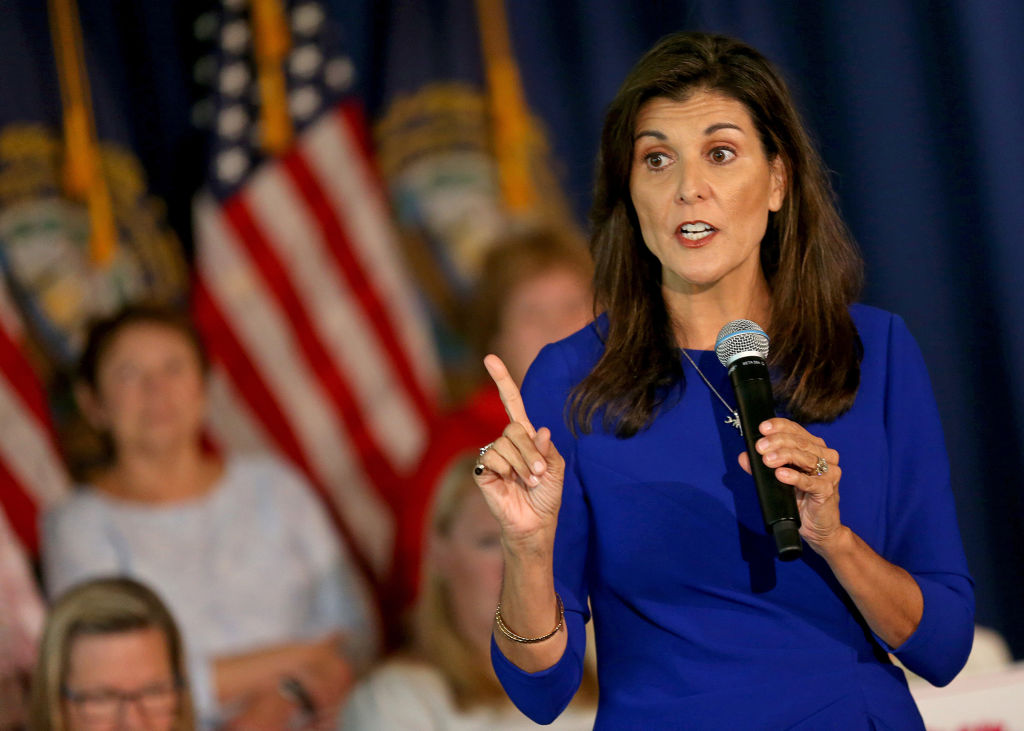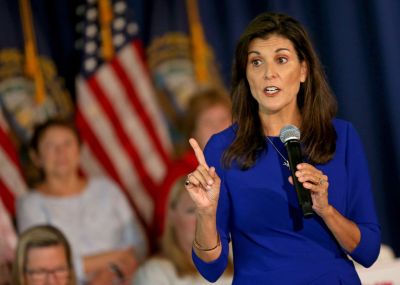HANOVER, New Hampshire—Nikki Haley is good on the stump. Republican voters who fill her town halls sure seem to think so, repeatedly interrupting the former South Carolina governor with applause and showering her with compliments. Yet her presidential campaign is still searching for a breakthrough.
Haley says she isn’t worried.
“I am comfortable with every benchmark I’m hitting,” she tells The Dispatch in an interview. “I fully expect us to stay where we are until midfall. Then, by midfall, it’ll start to shake up after the debates, after things start to move and all that’s going to happen.”
Haley entered the race in mid-February, three months after former President Donald Trump, in whose Cabinet she served for two years as U.S. ambassador to the United Nations. She has remained mired in the low single digits in state and national polls, and trails her former boss by 50 percentage points in some cases.
But Haley is looking beyond polls to assess the campaign so far. Her goals, she says, were to have a good roll out (check); be well received in Iowa and New Hampshire (check); and exhibit financial strength (check.)
That last benchmark is subjective: Haley announced that she raised $7.3 million in this year’s second quarter and closed the three month period, ending June 30, with a $9.3 million war chest. Those figures didn’t come close to Trump, who raked in more than $35 million, or Florida Gov. Ron DeSantis, whose haul totaled $20 million after only six weeks as a candidate. Haley counters that she is collecting enough money to propel her campaign to that magic, midfall point in the race.
“We have now had 150,000 donations from all 50 states. We qualified to be on the debate stage. That’s another benchmark. Now the next thing is, okay, the debates start in August, so we’ll do that,” Haley said. “At the end of the day, we’ll end up finishing it. I have no doubt.” (To qualify for the August 23 debate in Milwaukee, the Republican National Committee requires candidates to acquire 40,000 unique donors, including 200 each in at least 20 states and U.S. territories.)
Last week Haley had New Hampshire to herself while her competitors traversed Iowa. She journeyed to the state’s bucolic “North Country.” The region’s forest-covered mountain ranges, chiseled with jagged edges of the state’s namesake granite, are dotted with small, middle class towns popular with summer tourists. Haley hosted traditional, town hall-style campaign events in conservative North Conway, Lincoln, and Lancaster. She also visited Hanover, the liberal, Ivy League enclave straddling the Vermont border that tends to get less attention from Republican presidential contenders.
All her campaign events were crisply staged, swelled to capacity with anywhere from near 100 to near 300 attendees, and all featured a candidate who was rhetorically and stylistically consistent.
Haley dished out the same self-deprecating quips and related the same heartfelt personal stories she has used throughout the campaign. She also knocked President Joe Biden, and to a lesser degree, Trump, with familiar, cutting critiques. And she also offered voters the same future-oriented, positive agenda across all of her town hall meetings—hour-long events divided evenly between opening remarks and an unscreened question-and-answer session.
The crowds found her compelling, nodding along, cheering, sticking around after for chit-chat and selfies. These were interested buyers. But Haley is still struggling to make the sale.
“I’m shopping. I’m looking for what I would consider a standard, Willam F. Buckley conservative Republican. Nikki Haley’s one possibility,” said 69-year-old retiree Jim Lefebvre last Thursday. “Mr. Trump is not.”
“Pretty much everything that she said resonated with me,” Mary, a retiree in Hanover who declined to give her last name, told The Dispatch Saturday as she exited Haley’s town hall. “I’m stuck between three candidates right now,” the Republican voter explained. “I like Vivek Ramaswamy and I like Tim Scott and I like Nikki Haley.”
What Haley needs are more Debbie Cobbs. After attending Haley’s town hall in Lancaster on Friday, Cobb declared that the only woman in the GOP primary pried her away from another candidate. “I am going to support her,” said Cobb, a retired nurse who had supported DeSantis. “My thing is: How does she get past the Trump issue?”
It’s a fair question. Trump leads the field nationally with 52.6 percent in the RealClearPolitics average, followed by DeSantis (21 percent); former Vice President Mike Pence (6.3 percent); Haley (3.5 percent); Scott, the South Carolina senator (3.3 percent) and former New Jersey Gov. Chris Christie and Ramaswamy, the wealthy biotechnology entrepreneur, who each garner 2.5 percent. In New Hampshire, Trump leads with 44.3 percent, followed by DeSantis (17.7 percent); Christie (4.7 percent); Haley and Scott (4.3 percent); and Pence and Ramaswamy (2.7 percent.)
Attendance at political events in New Hampshire has been robust for all of the major candidates.
But it’s the season of summer travel and family vacationing, the first in years truly free from the coronavirus pandemic. Voters are simply not paying close attention, while the few that are only recently started to. CIting those reasons, Republican operatives in the Granite State insist it’s too early to crown the former president inevitable in what they emphasize is a late developing campaign.
“There is a lot of game to play here,” Gov. Chris Sununu told reporters last week during a conversation in his office in the New Hampshire Capitol, in Concord. “There’s going to be a huge rollercoaster of surges of great moments for these candidates. Of collapsing moments for some of these candidates. We’ve seen it before. We’re undoubtedly going to see it again.”
Sununu is neutral in the contest. However, the governor is prepared to use his clout to push straggling candidates out of the primary to prevent Trump from taking advantage of a divided field. Sununu has an open-door policy. He has been in touch with nearly every White House campaign, offering advice on how to navigate New Hampshire to the candidates who have sought him out, including Democrat Robert F. Kennedy Jr.
Meanwhile, Jason Osborne, majority leader of the New Hampshire House of Representatives and top DeSantis booster, says “it’s way too early to say that it’s even started.” Dismissing all of the fresh doubts swirling around the Florida governor, Osborne added: “I would say after the first debate, at the end of August, that’s when the campaign really starts for real. Folks just aren’t paying attention, other than the hardcore—this is their life.”
But this is what political insiders in the early primary states are programmed to say. If Republicans here—top elected officials, strategists and party activists—believe Trump has this race sewn up, and they actually say so, other candidates might stop showing up.
Worse, the voters might stop showing up to see them even if they keep coming. That could erode New Hampshire’s grip on its status as the state that hosts the first traditional primary on the presidential nominating calendar. (Nothing in this regard has changed for Republicans. But at Biden’s direction, the Democrats voted to demote New Hampshire and sanction South Carolina as host of their first primary.)
“President Trump would look to be in a pretty good position in New Hampshire,” Republican Jeb Bradley, president of the New Hampshire Senate and a former congressman, says as he weighs the candidates’ chances. “But New Hampshire’s also had a history of upstarts doing well.” Bradley, who introduced Haley in North Conway and spoke to The Dispatch afterward, said he was “impressed” with the underdog contender. His tone suggested he was surprised to have reached that conclusion.
Team Haley is all bravado.
This confidence is rooted in Haley lore. She defeated a powerful incumbent who had served decades in the South Carolina Legislature in her first Republican primary for a statehouse seat. She later won a GOP gubernatorial primary after being dismissed as an inconsequential candidate.
Haley’s presidential campaign says the candidate’s conviction that she is on track for success in this race is based on more than history. Their strategy is predicated on Republican voters being more interested in fresh leadership than is readily apparent; on Republican voters not truly engaging in this primary (yet); on only three other candidates being realistically positioned to win the nomination—Trump, DeSantis and Scott; and on the notion that Republican voters are only now really getting to know her.
Resources, they say, are not a problem. As one senior campaign official said: “Nikki Haley is a CPA. She is very frugal—much to our dismay.” The Haley campaign employs approximately 25 full-time staff and remains rather thin in Iowa and New Hampshire, a concern for Republicans in each of those states that would like to see her become a frontrunner. “It’s growing,” the senior campaign official says. “We are building it out.”
If there’s an issue that noticeably riles Haley up, it’s the oft-discussed theory that this whole exercise is a vanity project designed to win the running mate sweepstakes. Haley was asked if she finds the suggestion “insulting.”
“Would you be insulted?” Haley asked. “For people to imply that I’m doing this to be second? No, I’m doing this to win. I don’t play for second. I never have my whole life.”







Please note that we at The Dispatch hold ourselves, our work, and our commenters to a higher standard than other places on the internet. We welcome comments that foster genuine debate or discussion—including comments critical of us or our work—but responses that include ad hominem attacks on fellow Dispatch members or are intended to stoke fear and anger may be moderated.
With your membership, you only have the ability to comment on The Morning Dispatch articles. Consider upgrading to join the conversation everywhere.